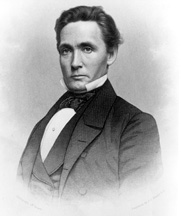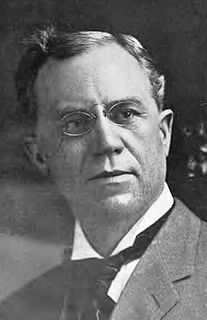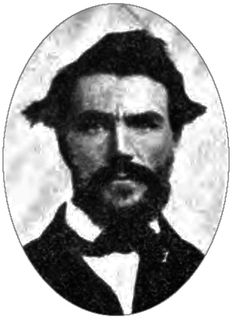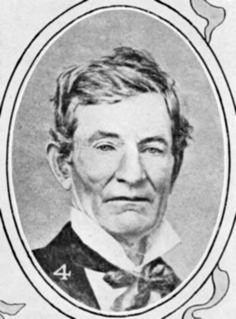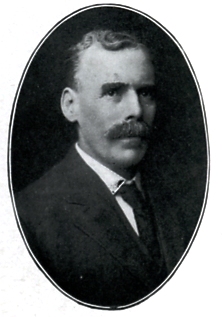



Charles Drain (December 28, 1816 – June 24, 1894) was a politician in the Oregon Territory and later the U.S. state of Oregon, and the founder of the city of Drain. He was born in 1816 near Lancaster, Pennsylvania. The family moved to Shelby County, Indiana, when Charles was five. Both parents soon died. He married Nancy Ensley in 1839, and in 1852 the family moved to Marion County, Oregon, and later to Linn County, to farm in the Willamette Valley. [1]
The Territory of Oregon was an organized incorporated territory of the United States that existed from August 14, 1848, until February 14, 1859, when the southwestern portion of the territory was admitted to the Union as the State of Oregon. Originally claimed by several countries, the region was divided between the UK and US in 1846. When established, the territory encompassed an area that included the current states of Oregon, Washington, and Idaho, as well as parts of Wyoming and Montana. The capital of the territory was first Oregon City, then Salem, followed briefly by Corvallis, then back to Salem, which became the state capital upon Oregon's admission to the Union.

Drain is a city in Douglas County, Oregon, United States. The population was 1,151 at the 2010 census. Drain is named after town founder and politician Charles J. Drain, who donated 60 acres (24 ha) of nearby land to the Oregon and California Railroad in 1871.

Lancaster is a city located in South Central Pennsylvania which serves as the seat of Pennsylvania's Lancaster County and one of the oldest inland towns in the United States. With a population of 59,322, it ranks eighth in population among Pennsylvania's cities. The Lancaster metropolitan area population is 507,766, making it the 101st largest metropolitan area in the U.S. and second largest in the South Central Pennsylvania area.
In 1855 Charles Drain was elected to the Oregon Territorial Legislature, [2] and during pre-admission statehood in 1858, Drain was elected to the Oregon State Senate. [3] He also served as President of the Council during the last session of the territorial legislature from 1858 into 1859. [4]

Oregon's Territorial Legislature was a bicameral legislative body created by the United States Congress in 1848 as the legislative branch of the government of the Oregon Territory. The upper chamber Council and lower chamber House of Representatives first met in July 1849; they served as the region's legislative body until Oregon became a state in February 1859, when they were replaced by the bicameral Oregon State Legislature.

The Oregon State Senate is the upper house of the statewide legislature for the US state of Oregon. Along with the lower chamber Oregon House of Representatives it makes up the Oregon Legislative Assembly. There are 30 members of the State Senate, representing 30 districts across the state, each with a population of 114,000. The State Senate meets at the Oregon State Capitol in Salem.
In 1860, Drain moved his family to Douglas County and began to purchase parcels that would become a 2,000-acre (810 ha) farm. He bought 320 acres (130 ha) from Jesse Applegate. At a price of one dollar, in 1872 he sold 60 acres (24 ha) to the Oregon and California Railroad to build the town and depot, which would become the city of Drain. [5]

Douglas County is a county in the U.S. state of Oregon. As of the 2010 census, the population was 107,667. The county seat is Roseburg. It is named after Stephen A. Douglas, an American politician who supported Oregon statehood.
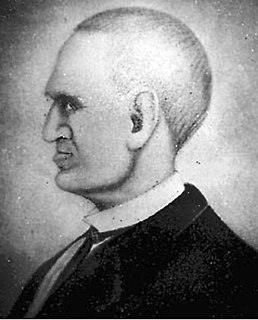
Jesse Applegate was an American pioneer who led a large group of settlers along the Oregon Trail to the Oregon Country. He was an influential member of the early government of Oregon, and helped establish the Applegate Trail as an alternative route to the Oregon Trail.
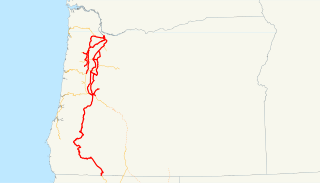
The Oregon and California Railroad was formed from the Oregon Central Railroad when it was the first to operate a 20-mile (32 km) stretch south of Portland in 1869. This qualified the railroad for land grants in California, whereupon the name of the railroad soon changed to Oregon & California Rail Road Company. In 1887, the line was completed over Siskiyou Summit, and the Southern Pacific Railroad assumed control of the railroad, although it was not officially sold to Southern Pacific until January 3, 1927.
Charles Drain died in 1894. His three surviving children included John C. Drain, who was the first mayor of Drain and a Speaker of the Oregon House of Representatives; [6] Catherine A. Drain (married Simon R. Lane, son of Joseph Lane); and Charles Douglas Drain, builder of the Charles and Anna Drain House, a prominent Drain landmark.

Joseph "Joe" Lane was an American politician and soldier. He was a state legislator representing Evansville, Indiana, and then served in the Mexican–American War, becoming a general. President James K. Polk appointed Lane as the first Governor of Oregon Territory. When Oregon was admitted as a state in 1859, Lane was elected one of Oregon's first two U.S. Senators.

The Charles D. Drain Jr. House, also known as the Charles and Anna Drain House, in Drain, Oregon, is listed on the National Register of Historic Places. Construction of the house was commissioned by Charles Douglas Drain, the youngest son of town founder Charles Drain. Completed in 1895, the house is a prominent example of Queen Anne style architecture in Drain. The owners selected architect George Franklin Barber's Cottage Souvenir No. 2 - design number 37. Currently, the Drain school district headquarters are at the house.
